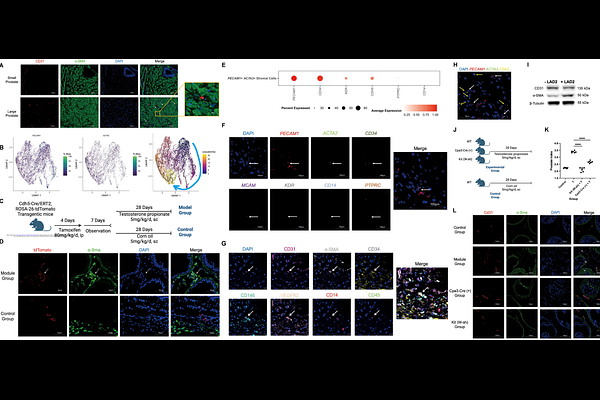Senescent mast cells contribute to the progression of benign prostatic hyperplasia via SCF/c-KIT mediated endothelial-mesenchymal transition

Senescent mast cells contribute to the progression of benign prostatic hyperplasia via SCF/c-KIT mediated endothelial-mesenchymal transition
Jing, Y.; Li, L.; Guo, W.; Cao, T.; Tang, J.; Zhou, D.; Yao, C.; Xu, J.; Liu, Y.; Feng, C.; Shi, Y.; Wang, M.; Chao, W.; Liao, H.; He, J.; Qin, L.; Luan, J.; Wang, X.; Cui, D.; Zhu, Y.; Ruan, Y.; Xia, S.; Han, B.
AbstractBenign prostatic hyperplasia (BPH) is a common age-associated urological condition characterized by stromal expansion, but its cellular origins and regulatory mechanisms remain unclear. In this study, we identified endothelial-to-mesenchymal transition (EndMT) as a contributor to stromal cell accumulation in BPH. Using single-cell transcriptomic analysis, endothelial lineage tracing in mice, and validation in human samples, we showed that senescence-associated mast cells increased the expression of vascular endothelial growth factor A (VEGFA) and transforming growth factor-beta 1 (TGF-{beta}1) through the stem cell factor (SCF)/c-KIT-MAPK-JUND signaling pathway, thereby inducing EndMT in endothelial progenitor cells. Stromal fibroblasts express SCF, promoting mast cell activation and establishing a feedback loop that supports continued stromal proliferation. Intriguingly, inhibition of mast cell activation reduces EndMT and attenuates prostate enlargement in vivo.Thus, these findings revealed a senescence-linked immune - stromal interaction in the aging prostate and identify potential targets for therapeutic intervention in BPH.